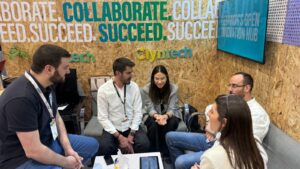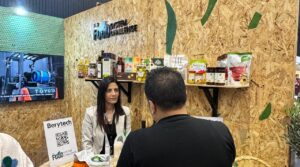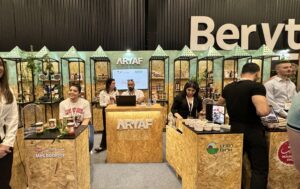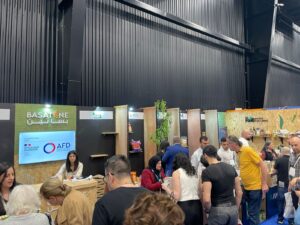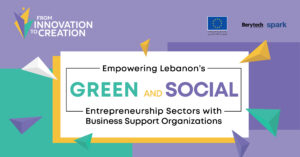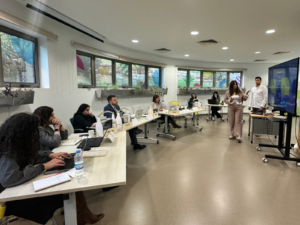
Berytech Meetups powered by GIST recently gathered leading social entrepreneurs and experts to discuss the role they’ve been playing in empowering the Lebanese to address the multitude of challenges they face.
Indeed, by the end of 2020, Lebanon had been through a perfect storm of revolution, currency devaluation, Covid19 pandemic, and a surge in unemployment, inflation and poverty numbers. While the change in the political leadership has been long overdue, the efforts to save the country and the society remain on the shoulders of civil society and bold social entrepreneurs.
The two Berytech Meetups sessions covered the importance of social ventures in this Lebanese context, the need to use science and technology for social and environmental good, and the different opportunities presented to social entrepreneurs by the ecosystem in general and Berytech in particular.
Social Entrepreneurship for Lebanon
For the first session, we sat with Jessica Ghaoui – Senior Business Development & Programs Officer at Berytech, who is currently managing the Impact Rise program that helps entrepreneurs scale their venture while stressing on the impact they are creating,
Jay Joseph – Entrepreneurship and Peace Professor at AUB, whose work focuses on entrepreneurship in conflict and post-conflict zones, linking international researchers with key research on entrepreneurship, enterprises and business collaborations with these areas,
Loulya Halawani – Marketing Manager at FabricAid, a social enterprise that grew very quickly to become one of the biggest clothes collectors in the region, working to complete the value chain from collecting, to fixing, reselling, and recycling,
and Georges Bitar – Founder of Live Love Recycle a social enterprise whose mission is to digitize the waste menagement sector to simplify recycling for people.
The speakers discussed the differences between a typical for-profit business and a social enterprise. Joseph pointed that a private enterprise is set up on selling a good or service which is oriented to creating profit. Any money that is made from a for-profit business goes to shareholders or to owners or can be re-invested back in the business. A social enterprise is created to fulfil a social or environmental need and it also operates like a business. It has to be financially sustainable, unlike an NGO which runs on donor funds, a social enterprise has to be able to make enough money to continue itself and the money that is made from social enterprises tends to be invested back into the business to further grow the impact.
For Ghaoui, a social enterprise is driven by a purpose, “Social entrepreneurs want to change the world, they want a better Lebanon, they are trying to create new jobs, improve infrastructure, enhance education, public health, all things that are lacking in Lebanon.”
The entrepreneurs debated what they consider the correct balance between achieving impact and growing the ability to serve more beneficiaries and achieving some profitability and a decent working package for the founders and employees.
Social Venture Sustainability
Halawani assures that sustainability is crucial for FabricAID: “Expanding means multiplying our impact, yet we prefer helping 10 people rather than trying to help 1000 people with a service that does not function properly. So, in order to grow the impact, we need to grow the way we do our business. To do that we need to be comfortable in the way we do business: having a strong in-house team for example was the way to go for us instead of having consultants or freelancers. We need people who are involved in the business enough to be able to grow it. We want to make sure that our team and our business can carry the load of the expansion before actually thinking about big numbers.”
From his part, Bitar points out that the model which Live Love Recycle has used so far focuses 100% on the social aspect and not on the business aspect. The startup has relied on grants to operate its free service, as selling recyclables was not enough to cover the cost of all their operation. The startup is launching an e-payment option of their application. “With the current financial situation, we decided to make the payment optional. If you can’t or don’t want to pay for the pick-up of your recyclables, it’s up to you. With every strategic decision we take, we are trying to keep our service as free as possible.”
“What makes a social enterprise is the value it brings to its community,” emphasizes Ghaoui. “Many people believe that social startups are startups that do not generate profit. It is the complete opposite. These are startups that are benefiting the society while also generating money. For the Impact Rise program, what Berytech has done is look at the growth plans of these startups and try to answer their needs by linking them to the right stakeholders. We’re connecting founders to coaches and mentors that are helping them scale their venture. We’re personalizing training sessions, mentorship and coaching to the needs of the startups.”
In his turn, Joseph explains the context in which social enterprises operate in Lebanon: “Social services and public assets are used and manipulated for purposes other than the good of the population and in particular minorities. Social enterprises play a critical role in a country like Lebanon, particularly if a network of social enterprises has built strong collaborations and strong supply chains. A group of social entrepreneurs can really operate on a sub-state level to deliver some of these goods and also meet the needs of the minority groups which are left behind.”
The Beirut Blast

The Beirut blast on August 4, 2020 had a severe impact on social entrepreneurs who found themselves in the eye of storm making vital strategic decisions as part of the immediate relief efforts that were ultimately thrown on their shoulders. FabricAID and Live Love Recycle were of no exception.
The recently built second-hand shop of FabricAID in Gemmayze was completely destroyed leaving two members of their team severely injured. They relocated it to Monot street and used it as a chance to re-imagine the shopping experience. Despite that, the startup and its passionate team deeply involved in the local community did not shy away from collaborating with Leb Relief and UNICEF to reconstruct over 60 houses and give away more than 250 food and hygiene packages.
Similarly, the Live Love team suffered many physical injuries and damaged offices and warehouses. “I stayed at the hospital for 10 days,” recounts Bitar. “Once I recovered, we directly installed a recycling station in Gemmayze which people used to recycle all sorts of things from the blast. We have trucks who are until today collecting glass from around Beirut. We are also collecting food, medicine and clothes that we are distributing to NGOs.”
The work of social enterprises goes beyond the immediate impact on the local community to impacting decision making at a country level and lobbying for change.
Be the change
“When we started Live Love Recycle very few people believed in the idea,” recalls Bitar. “People told us that no one in Lebanon will recycle, no one cares about the environment and no one will use an application to recycle. Today we have 20,000 persons recycling with us in Beirut proving that there are people willing to recycle. As we continue to grow, we will be able to impact policy makers. Succeeding this is our way of making the change we want to see in the country. We’ve built a feature on our platform where people can create petitions for municipalities in their regions to show them that there are people willing to recycle and prompt them to install a system for recycling. We’re putting technology in the service of people to give them a voice. Using technology has allowed us to complete the cycle of recycling, reduce our costs, improve efficiency and provide live data, crucial for us to take strategic decisions.”
Similarly, for FabricAID, the more data the startup is able to gather the better it is able to operate. “We don’t know what we are getting from collection until it gets the warehouse so we need to know what we are getting every single day to know what we can sell the next day. It is very important for us to know how much each bin in collecting, whether it is a functional bin or a static bin. A simple change in bin location allows us to get more value from it. All of these things happen through a system we created internally so that the whole chain can be closed from the moment the donation gets into the bin to the moment its sold in the store,” details Halawani.
In his wrap up comment, Joseph pointed out that most of the problems that Lebanon faces today have existed for a very long time and are probably not going away any time soon. His advice for potential social entrepreneurs is to “spend more time in planning before jumping into action. You can get good financial strength from what your business model looks like, so talk to experts and take advice before jumping in. Build a solid business plan and spend more time in that phase before launching into something quickly.”
Social Entrepreneurship, Merging Tech & Impact
Social Entrepreneurship endeavors are not limited to international and local Non-Government Organizations. Hackers, makers, and tech enthusiasts have been bridging the worlds of technology and social work by launching for-profit businesses that have not only the purpose of generating money, but also a double bottom line that includes enhancing local communities and the environment as well.
Social entrepreneurs use technology to enhance the living standards for the marginalized segments of society and drive impact-centric endeavors in MENA. In 2020, many questions were raised about the negative side of a growing influence of tech giants over the global economy and our day-to-day life. However, technological solutions, advanced or simple, can be leveraged for social good and it is the role of social entrepreneurs to connect the worlds of technology and social work to help those who suffered the most in 2020.
Joining the conversation in the second session were Krystel Khalil – Programs Director at Berytech, mainly managing programs related to green and social entrepreneurship on the Euro-Med regional scale,
Mona Itani – Program Lead of the entrepreneurship initiative at the Engineering Faculty at AUB and Founder & CEO of Riyada for social Innovation which is a social enterprise specialized in social innovation and education for the youth,
Rabab Kawtharani – Cofounder and CFO of Heatechs, a social enterprise that offers environmentally friendly solutions to problems related to cooling and heating using the latest material technology. Heatetchs is the winner startup for social enterprises at Hult Prize Lebanon 2018,
And Naim Zard – CEO of Zima Cloud, a software for small internet service providers (ISPs) that enables them to manage their operations and user subscriptions. The software is currently used by ISPs in 17 countries.
Lebanon’s Growing Ecosystem
Opening the session, Itani and Khalil discussed the current ecosystem supporting the creation and growth of social enterprises.
Itani addressed the importance of contextualizing social endeavors for university students: “You have to keep in mind the current and specific challenges you face in this society because when convincing university students to pursue entrepreneurship you cannot tell them the story that is told in the US for example. You have to tell them a story that makes more sense to them. If you want to convince students to pursue their ideas passionately, they have to work on something that they really care about, something that stems from their own experiences or from close people around them, problems that they face in their community. This is where I believe social entrepreneurship resonates very well with them because when they are working towards a case that they really believe in they will have more passion, more perseverance more tolerance to all the challenges that they are going to face in their entrepreneurial journey.”
From her experience, Khalil recounts the growing appetite to create startups with impact in the last decade: “The growing ecosystem is much more active while involving various stakeholders, each one on their own support level. Social impact is being adopted across all sectors. In Berytech’s Impact Rise program, we push ventures to integrate innovation, social impact and sustainability. This is what will help social entrepreneurs grow their ventures. The opportunities in the ecosystem are also growing. There are new programs and new grants that will be available for social entrepreneurs in 2021 because it’s a need in our current economic and social context. Facing many challenges means having many opportunities to tackle in social entrepreneurship whether in environmental challenges, job creation, women empowerment, health sector, the shift in the education sector, food security, to name a few. Ventures need to leverage on technology to scale their impact and grow the venture’s activity not only on a local level but on a regional and international level. Technology will create opportunities to share experiences, to replicate models and to make collaborations.”
Leveraging Technology
Zard launched his venture to solve a problem faced by a local ISP (internet service provider): “In order to manage their operations they needed a management software. The available software on the market is very expensive and only sold to big ISPs and not accessible to smaller ones. We happily installed the new software for some neighbors and friends who also wanted it. From there, we launched a website with a simple contact form expecting to get leads from Lebanon. Not only did we get that, but we started getting emails from counties like India, Pakistan and South Africa. We were shocked by the demand for the software in those countries. We started communicating with the ISP community around the world and learned more about the features they needed, and we started developing them. After a while, we did a complete rewrite of the whole software to become completely cloud-based solving the problems of hardware crashes and lack of infrastructure that these ISPs faced.”
4 billion people have access to the internet, the rest of the world is unconnected or has very limited options for an internet connection. ISPs need to pay from $10k to $12k in servers and infrastructure to start. What Zima did is integrate all those features in a single system. The startup has created packages for different types of clients in different countries with different needs and accessibility.
“We have learned through our communication with ISPs that communities for example in India and South Africa cannot pay enough for the services, so we created country-adjusted pricing, subsidizing the price of services for those countries. The other model is the free model launching soon that will be completely free with access to 80% of the features. The model is aligned with our mission to empower internet providers worldwide. Empowering small ISPs means providing this software for free for people who are not ready or able to pay. When they later become well established and would like to go for premium features and other extra services, they will be able to subscribe to a paid package.”
Kawtharani shared the story of the launch of her venture: “Heatechs started with 4 engineering students who shared common interest in everything related to material science and technology. We came up with a very crazy idea based on a technology called face change material. We used it to apply to the Hult prize. The technology is very innovative and very powerful, so the idea of the technology itself made us fall in love with it, we didn’t really look for a problem to solve using it.
Then we realized that this is not how things work. We need to solve a real problem, to find a pain that this technology could be an answer to. This is when we met a girl named Farah in one of the refugee camps. She had lost her parents to a fire that burned down the camp caused by a fire the refugees burn at night in winter to stay warm. This is when we knew that our technology could have a very great impact in improving and saving lives.
We work with a unique material that has the ability to store heat and dissipate it in a manner where you can use this heat for a longer period of time. We decided to implement this technology in pads to be used for night conditioning. It can save money on fuel and electricity bills but also save the lives of a lot of people who leave their stoves on or turn campfires on at night to stay warm.
Currently there are two versions of Heatechs, one that is designed and sold for consumer home use and another that is delivered for people in refugee camps. For every Heatech that is being sold there’s a number of Heatechs pads distributed for charity and refugee camps in collaboration with the NGOs that we are working with.”
The idea for Riyada emerged when Itani realized that many university students were disconnected from social problems and aren’t utilizing engineering solutions or technology for social good. “I thought that if we want to train them it needs to be before they join university. I came up with the idea, put together a pilot program and addressed it to high school students testing their receptibility. So far, we’ve done more than 20 programs, most of which are partnerships with different organizations. We’re planning to launch an e-learning platform that addresses the current need in order to maximize the reach to high school students and integrate this mindset of social entrepreneurship and using technology for good in their brains very early on.”
It’s your time!
On that note, Berytech’s Khalil wrapped up by calling for the people thinking about launching a social venture: “It’s your time! It’s THE time to start and grow a social venture, to think about long term impact and sustainability and create collaborations. There are many opportunities in this field and many structures to help.
Berytech will be creating many opportunities in 2021 through its programs. We are going to recruit ventures with impact in different sectors such as tackling textile innovation, circular economy, impact in water, as well as food and energy sectors on a regional scale. Ventures leveraging science and technology for social and environmental good stay up to date with the Berytech opportunities as there is many coming your way. It’s your time!”
Related posts


